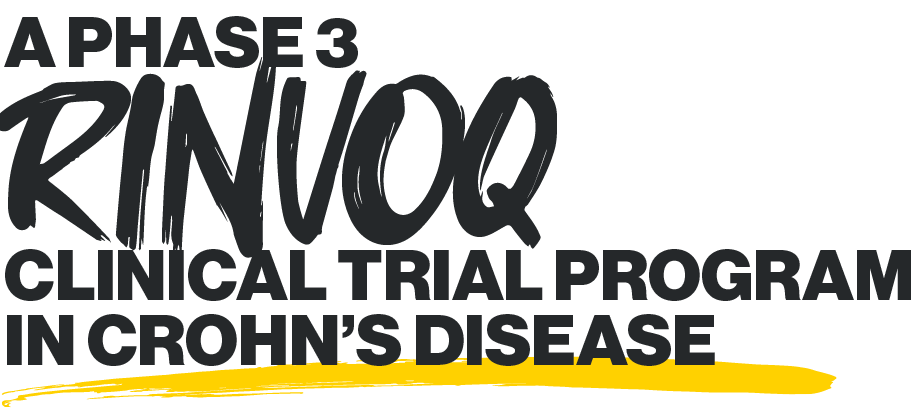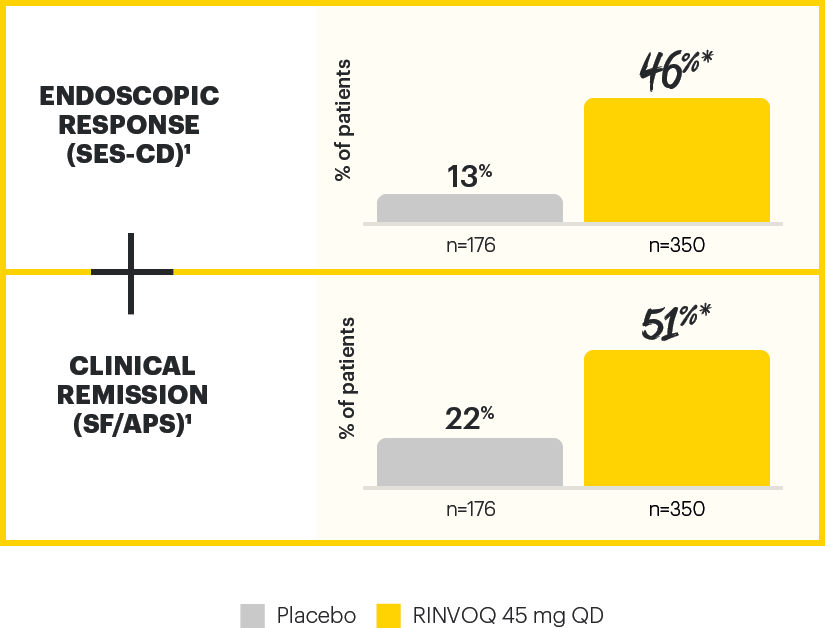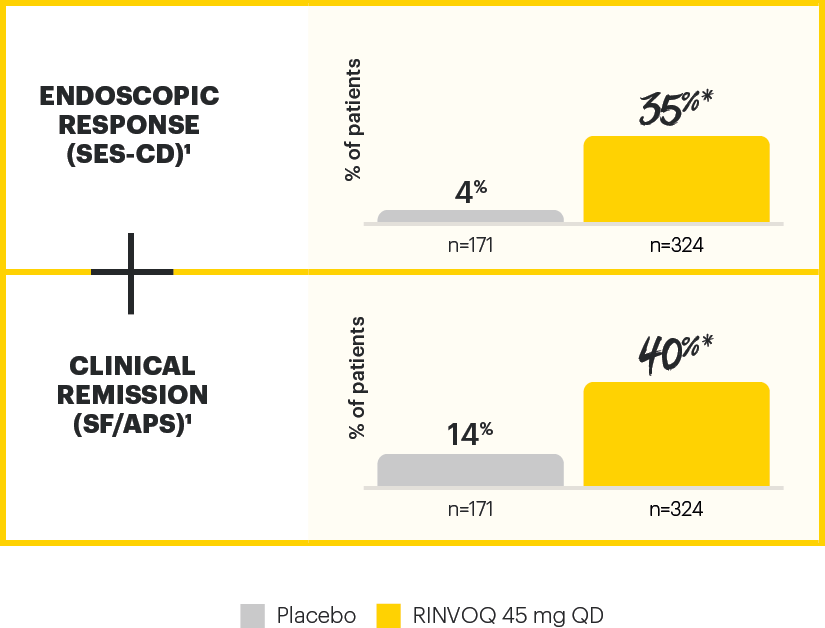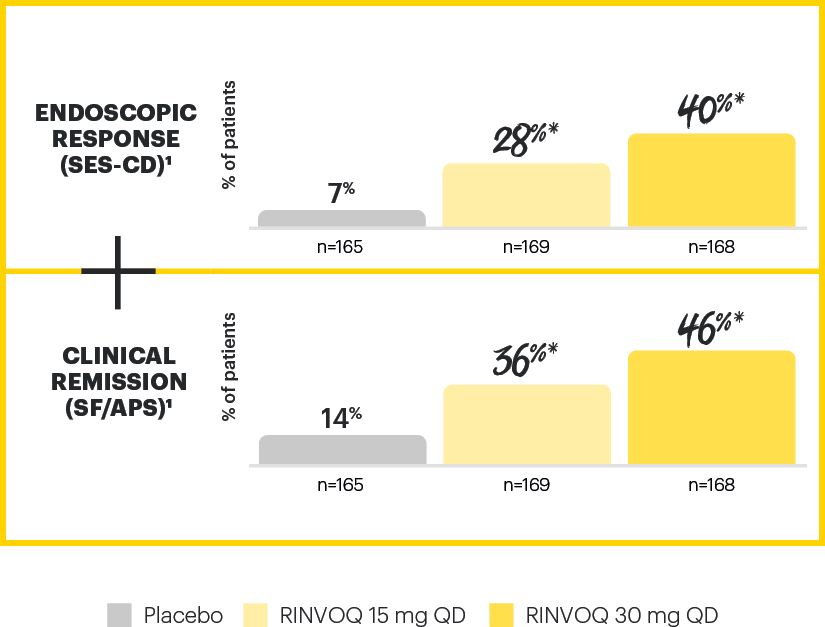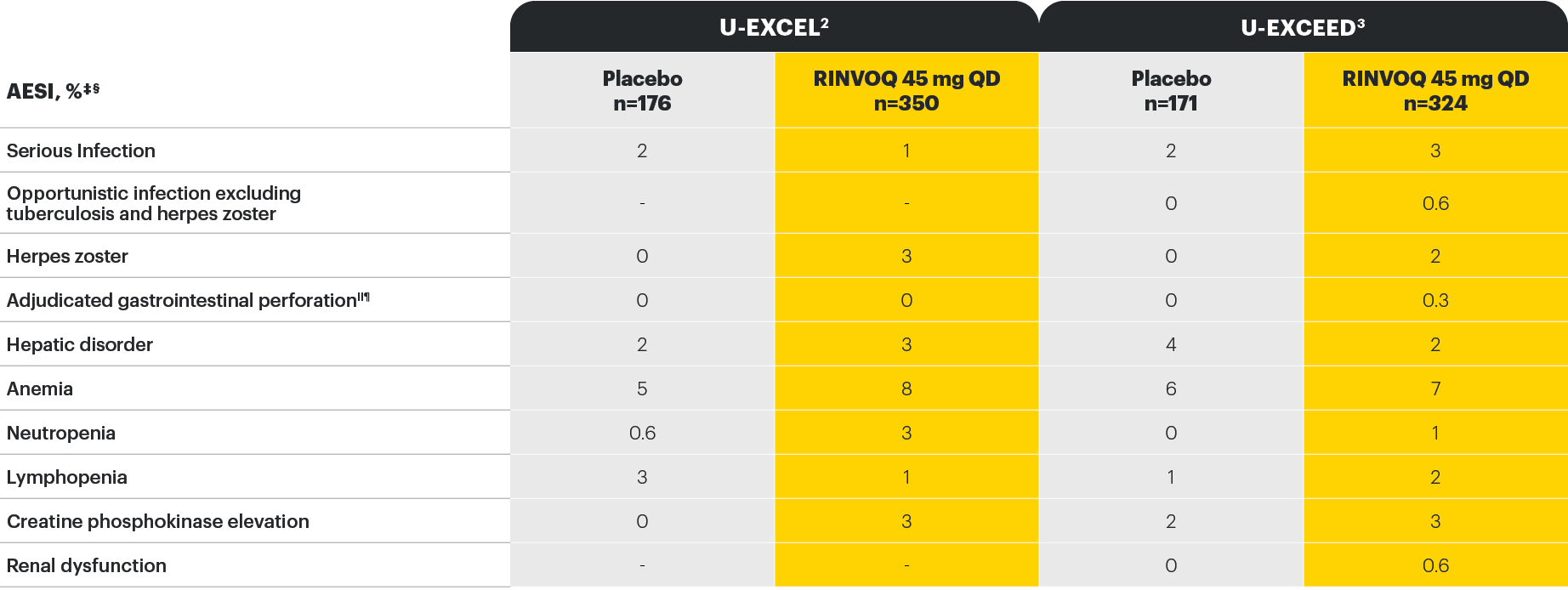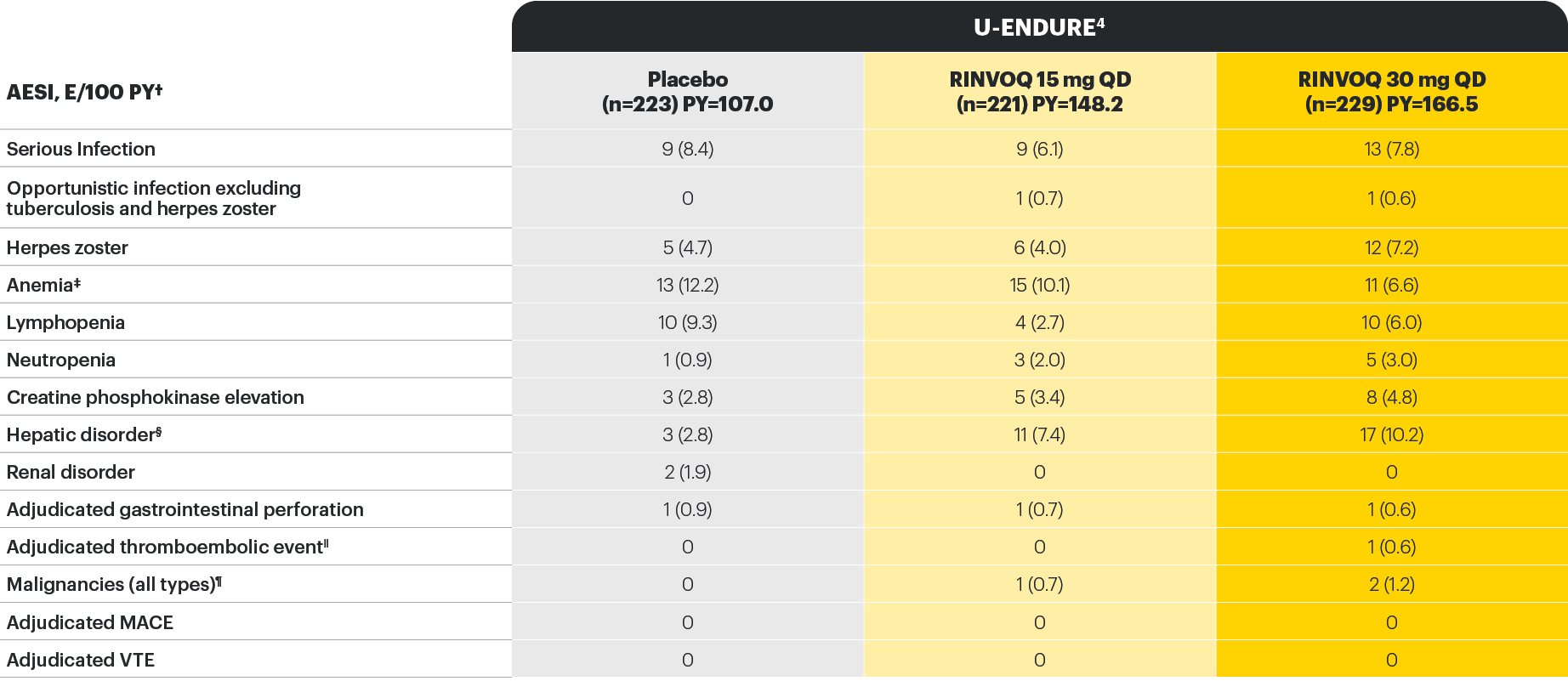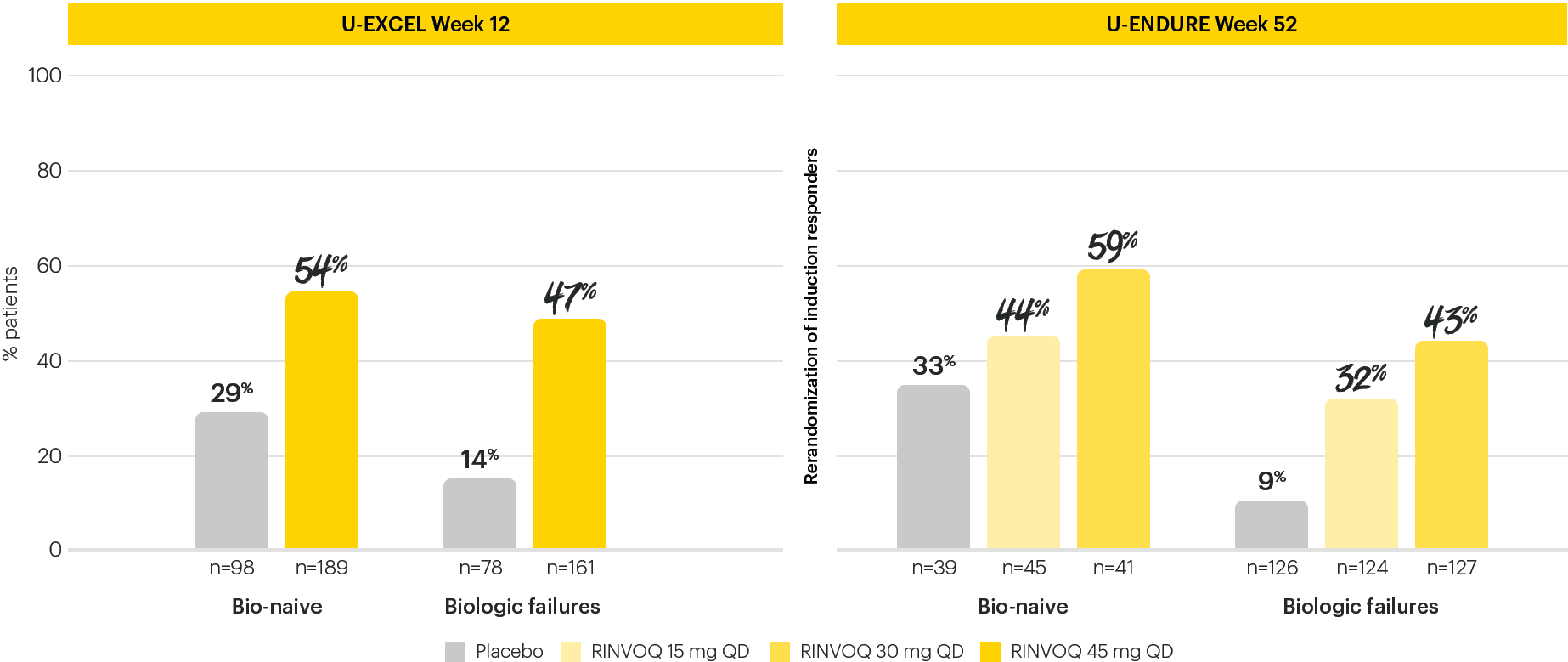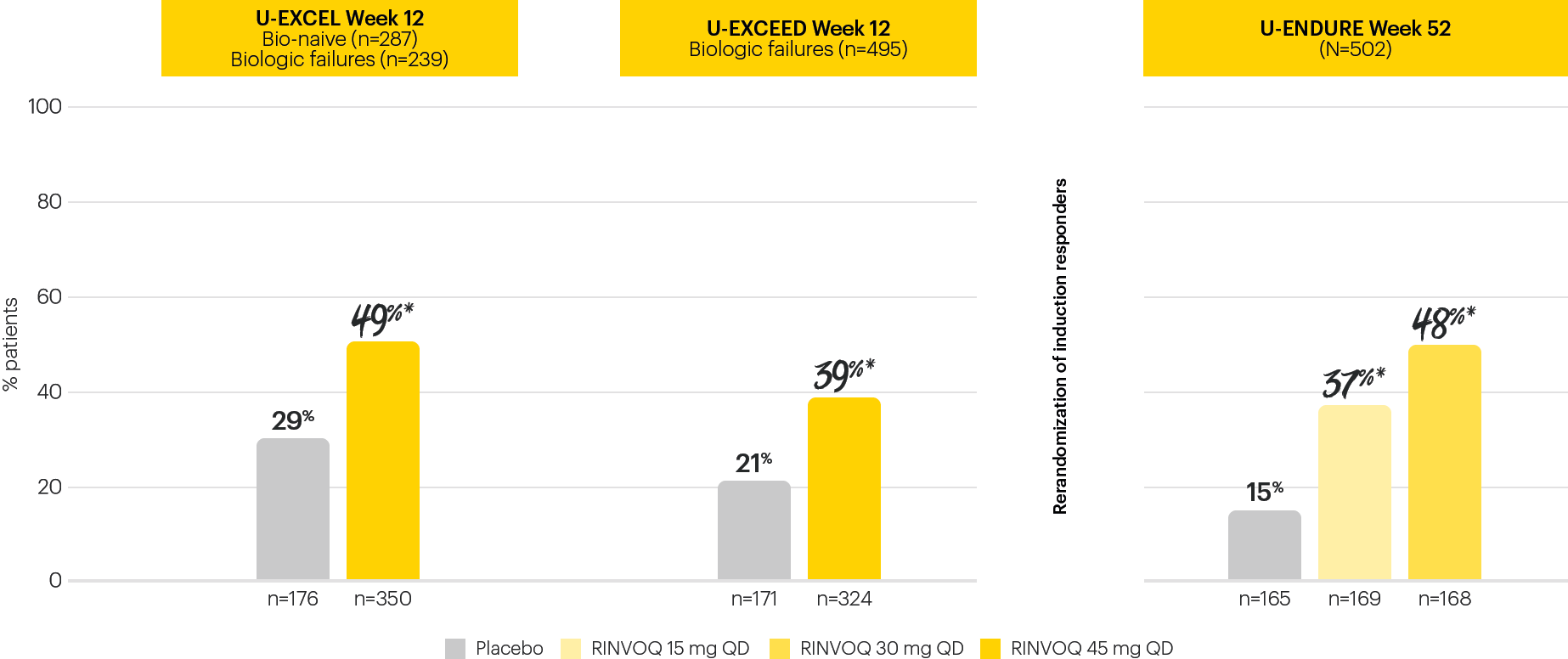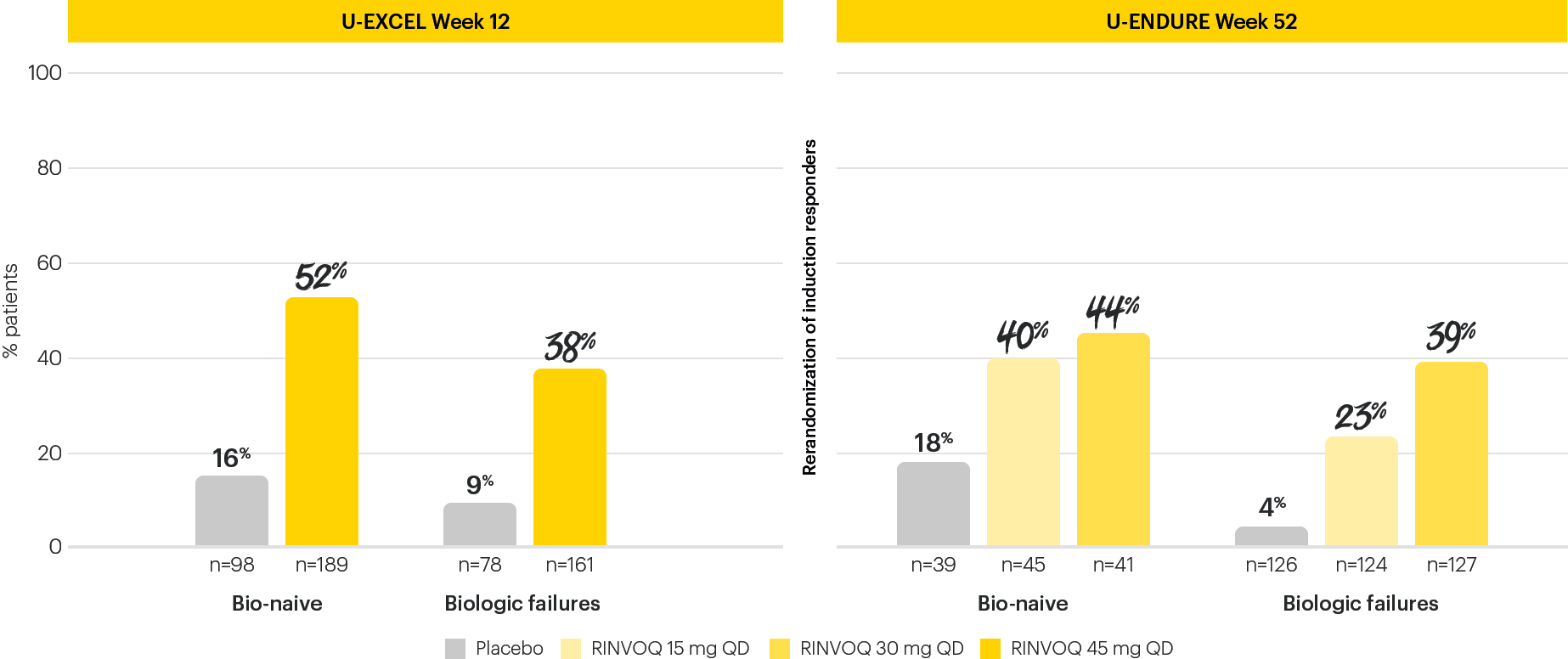DRAFT FOR INTERNAL USE ONLY
This DRAFT of the Global RINVOQ CD AbbVie Pro (v0.2) has been developed based on the DRAFT RINVOQ CD CLM, ALL-RNQG-220127 (v1.0).
RINVOQ CD was approved by the European Commission in April 2023 and the DRAFT CLM is being updated accordingly but is not final approved. When implemented locally, affiliates must align AbbVie Pro to the forthcoming final approved RINVOQ CD CLM, ALL-RNQG-220127 (version to be determined).
Note to Affiliates: Please evaluate use of ALL claims, graphs/tables, and corresponding references (e.g., data on file, abstracts, posters, manuscripts) according to local standards, codes, and regulations.
RINVOQ® (upadacitinib) is indicated for the treatment of adult patients with moderately to severely active Crohnʼs disease (CD) who have had an inadequate response, lost response or were intolerant to either conventional therapy or a biologic agent.1
RINVOQ achieved its co-primary endpoints of endoscopic response and clinical remission at Week 12 (Induction) and Week 52 (Maintenance)1
▼ This medicinal product is subject to additional monitoring. This will allow quick identification of new safety information. Healthcare professionals are asked to report any suspected adverse reactions.
A Phase 3 trial program involving 3 studies:1
2 induction studies (U-EXCEL and U-EXCEED) and 1 maintenance study (U-ENDURE). 1,021 moderately to severely active CD patients evaluating RINVOQ 45 mg QD vs placebo for induction, and RINVOQ 15 mg QD or 30 mg QD vs placebo for maintenance treatment (N=502).1*
*Patients who achieved clinical response (≥30% decrease in average daily stool frequency and/or in abdominal pain score, neither worse than baseline) to 12 weeks of RINVOQ 45 mg QD induction treatment entered maintenance.
EARLY ENDOSCOPIC RESPONSE AND CLINICAL REMISSION AT WEEK 12 (CO-PRIMARY ENDPOINTS)1
—
In a bio-naive and refractory patient population,† RINVOQ achieved its co-primary endpoints of endoscopic response and clinical remission at Induction Week 12 and Maintenance Week 521-3
—
The Week 12 analysis evaluated randomized patients who received at least one dose of study drug in the randomized induction.2
*P<0.001; RINVOQ vs placebo.
†Refractory population based on percentage of patients treated with more than one prior biologic.
—
In a bio-naive and refractory patient population,† RINVOQ achieved its co-primary endpoints of endoscopic response and clinical remission at
Induction Week 12 and Maintenance Week 521-3
—
The Week 12 analysis evaluated randomized patients who received at least one dose of study drug in the randomized induction.2
*P<0.001; RINVOQ vs placebo.
†Refractory population based on percentage of patients treated with more than one prior biologic.
LONG-TERM ENDOSCOPIC RESPONSE AND CLINICAL REMISSION AT WEEK 52 (CO-PRIMARY ENDPOINTS)1
—
In a bio-naive and refractory patient population,† RINVOQ achieved its co-primary endpoints of endoscopic response and clinical remission at Induction Week 12 and Maintenance Week 521-3
—
The efficacy analysis at Week 52 evaluated 502 patients who acheived clinical response (SF/APS) with the 12-week RINVOQ 45 mg QD induction treatment.1
*P<0.001; RINVOQ vs placebo.
†Refractory population based on percentage of patients treated with more than one prior biologic.
WELL-STUDIED SAFETY PROFILE IN CROHNʼS DISEASE THROUGH WEEKS 12 AND 52
*As assessed by investigator.
†In U-EXCEED, there was one non-treatment emergent death due to infectious shock in a patient who received RINVOQ 45 mg QD for 5 days; the death occurred 159 days after premature discontinuation from the study.
‡In U-EXCEL, no opportunistic infections (excluding tuberculosis and herpes zoster), tuberculosis, renal disorders, adjudicated cardiovascular or venous thromboembolic events, or cancer of any kind were observed in either group.
§In U-EXCEED, no tuberculosis, major adverse cardiovascular events, adjudicated venous thromboembolic events, or cancer of any kind were observed in either group.
||In U-EXCEL, one event of adjudicated gastrointestinal perforation (intestinal perforation) was reported in a patient who was a clinical nonresponder to placebo and was on RINVOQ 45 mg QD in the extended treatment period.
¶In U-EXCEED, 2 additional events of adjudicated gastrointestinal perforation (retroperitoneal abscess and ileal perforation) were reported in patients who were nonresponders to placebo and were on RINVOQ 45 mg QD in the extended treatment period.
*As assessed by investigator.
†No tuberculosis, adjudicated cardiovascular, or nonmelanoma skin cancer events were observed in any treatment group.
‡Anemia (which includes other preferred terms, in addition to the preferred term “anaemia”), herpes zoster, neutropenia, and lymphopenia were based on CMQ search.
§Hepatic disorder included transaminase elevations that were mild or moderate, asymptomatic, nonserious, and uncommonly led to treatment discontinuation.
||Hepatic vein thrombosis concurrent with an event of exacerbation of CD.
¶Metastatic ovarian cancer in a patient in the RINVOQ 15 mg group and colon cancer and invasive lobular breast cancer in one patient each in the RINVOQ 30 mg QD group.
AE: adverse event; AESI: adverse event of special interest; APS: abdominal pain score; CDAI: Crohn’s Disease Activity Index; JAK: Janus kinase; MACE: major adverse cardiac event; PY: patient years; QD: once daily; SES-CD: simple endoscopic activity score for Crohn’s disease; SF: stool frequency; TEAE: treatment-emergent adverse event; VTE: venous thromboembolism.
Study designs: the U-EXCEL and U-EXCEED induction studies were both multicenter, double-blind, placebo-controlled clinical studies. In U-EXCEL (N=526 [287 bio-naive, 239 biologic failures]) and U-EXCEED (N=495 biologic failures only), patients were randomized to RINVOQ 45 mg QD or placebo for 12 weeks with a 2:1 treatment allocation ratio and included in the efficacy analysis. In both studies, induction nonresponders were allowed to enter an additional 12-week open-label extended treatment period. All enrolled patients had moderately to severely active CD defined as SF ≥4 and/or APS ≥2, plus an SES-CD ≥6 (≥4 for patients with isolated ileal disease) excluding the narrowing component. U-ENDURE maintenance was a multicenter, double-blind, placebo-controlled clinical study with 502 patients who achieved clinical response (≥30% decrease in average daily SF and/or in APS, neither worse than baseline) to 12 weeks of RINVOQ 45 mg QD induction treatment. These patients were rerandomized 1:1:1 to receive either RINVOQ 15 mg QD, 30 mg QD, or placebo.1
Endoscopic response (co-primary endpoint): decrease in SES-CD >50% from baseline of the induction study (or for patients with an SES-CD of 4 at baseline of the induction study, at least a 2-point reduction from baseline of the induction study). Clinical remission (co-primary endpoint; SF/APS): average daily SF ≤2.8 and APS ≤1.0 and neither greater than baseline. Clinical remission (secondary endpoint, CDAI): CDAI <150.
UP NEXT
RINVOQ is an oral, once daily, selective and reversible JAK inhibitor now approved for the treatment of adult patients with moderately to severely active Crohn’s disease who have had an inadequate response, lost response or were intolerant to either conventional therapy or a biologic agent.1
RINVOQ can be taken at any time of the day, with or without food. Tablets should be swallowed whole and should not be split, crushed, or chewed in order to ensure the entire dose is delivered correctly.1
A Phase 3 clinical trial program involving 3 studies: 2 12-week induction studies evaluated RINVOQ 45 mg QD vs placebo, and 1 52-week maintenance treatment and long-term extension study evaluated RINVOQ 15 mg QD and RINVOQ 30 mg QD vs placebo.1
Learn more about RINVOQ in our quick introductory video.
[Affiliates to insert local summary of safety]
REFERENCES
- RINVOQ [Summary of Product Characteristics]. AbbVie Deutschland GmbH & Co. KG; April 2023.
- Loftus EV Jr, Colombel JF, Lacerda AP, et al. Efficacy and safety of upadacitinib induction therapy in patients with moderately to severely active Crohn’s disease: results from a randomized phase 3 U-EXCEL study. Presented at: United European Gastroenterology Week; October 8-11, 2022; Vienna, Austria.
- Colombel JF, Panes J, Lacerda AP, et al. Efficacy and safety of upadacitinib induction therapy in patients with moderately to severely active Crohn’s disease who failed prior biologics: results from the randomized phase 3 U-EXCEED study. Presented at: Digestive Disease Week; May 21-24, 2022; San Diego, CA.
- Panes J, Loftus EV Jr, Lacerda AP, et al. Efficacy and safety of upadacitinib maintenance therapy in patients with moderately to severely active Crohn’s disease: results from a randomized phase 3 U-ENDURE maintenance study. Presented at: American College of Gastroenterology Annual Meeting; October 21-26, 2022; Charlotte, NC.




